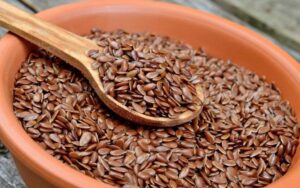Health Benefits of Flax Seed & How to Consume These for healthy life
Flax seeds, also known as linseeds, are the seeds of the flax plant (Linum usitatissimum). They are small, flat, and oval-shaped with a shiny appearance. Flax seeds have been cultivated for thousands of years and are primarily grown for their oil and nutritional benefits. Flax seeds are rich in various nutrients and bioactive compounds, making them a valuable addition to a healthy diet. They are particularly known for their high content of omega-3 fatty acids, specifically alpha-linolenic acid (ALA). Omega-3 fatty acids are essential fats that play a crucial role in maintaining overall health, particularly in supporting heart health, brain function, and reducing inflammation.
In addition to omega-3 fatty acids, flax seeds are a good source of dietary fiber, both soluble and insoluble. The soluble fiber in flax seeds helps regulate blood sugar levels and cholesterol levels, while the insoluble fiber promotes healthy digestion and helps prevent constipation. Flax seeds also contain lignans, which are phytoestrogens with antioxidant properties. Lignans are believed to have various health benefits, including potential anti-cancer effects and support for hormonal balance.
It’s important to note that flax seeds are not typically consumed whole but rather ground or in oil form. Grinding flax seeds enhances their digestibility and allows better access to the nutrients. The outer shell of flax seeds is quite tough and may pass through the digestive system undigested if consumed whole. Flax seeds can be used in a variety of culinary preparations, including baking, smoothies, yogurt, and as a topping for cereals or salads. It’s recommended to store flax seeds and ground flaxseed meal in an airtight container in a cool, dark place to maintain their freshness and prevent oxidation.
Here are some of the key health benefits associated with flax seeds:
1. High in Omega-3 Fatty Acids:
Flax seeds are an excellent plant-based source of omega-3 fatty acids, specifically alpha-linolenic acid (ALA). Omega-3 fatty acids are important for heart health, brain function, and reducing inflammation in the body.
2. Rich in Dietary Fiber:
Flax seeds are packed with dietary fiber, both soluble and insoluble. The soluble fiber in flax seeds helps regulate blood sugar levels, improve digestion, and promote a feeling of fullness, aiding in weight management. Insoluble fiber supports bowel regularity and helps prevent constipation.
3. Cardiovascular Health:
The omega-3 fatty acids, lignans, and fiber in flax seeds contribute to cardiovascular health. Omega-3 fatty acids help lower blood pressure, reduce cholesterol levels, and decrease the risk of heart disease. Lignans, a type of antioxidant, have been associated with reduced risk of heart disease and improved lipid profiles.
4. Anti-Inflammatory Effects:
The omega-3 fatty acids and lignans in flax seeds possess anti-inflammatory properties. These compounds may help reduce inflammation in the body, potentially benefiting conditions such as arthritis, asthma, and inflammatory bowel disease.
5. Digestive Health:
The high fiber content in flax seeds promotes digestive health. It helps regulate bowel movements, prevent constipation, and support the growth of beneficial gut bacteria. The mucilage, a gel-forming fiber in flax seeds, can also help soothe the digestive tract.
6. Hormonal Balance:
Flax seeds contain lignans, which are phytoestrogens that have a mild estrogenic effect in the body. They may help balance hormone levels, particularly in menopausal women, potentially reducing menopausal symptoms like hot flashes and supporting overall hormonal health.
7. Weight Management:
The combination of fiber, healthy fats, and protein in flax seeds can help promote satiety, reduce hunger cravings, and support weight management goals. Including flax seeds in your diet may aid in weight loss or weight maintenance.
8. Skin and Hair Health:
The omega-3 fatty acids and antioxidants in flax seeds can contribute to healthy skin and hair. They help reduce inflammation, promote moisture retention in the skin, and support the growth of strong and shiny hair.

How to Consume Flex Seed
Flax seeds can be consumed in various ways to incorporate them into your diet. Here are some popular methods:
1. Crushed Flax Seeds:
Whole flax seeds are difficult for the body to digest and may pass through undigested. Therefore, it’s recommended to grind flax seeds before consumption to make the nutrients more accessible. You can use a coffee grinder or a dedicated flaxseed grinder to grind them into fine powder.
2. Flaxseed Oil:
Flaxseed oil is another way to consume the beneficial components of flax seeds. It is rich in omega-3 fatty acids. You can drizzle flaxseed oil over salads, cooked vegetables, or use it in homemade salad dressings. However, note that flaxseed oil is not a source of dietary fiber as it lacks the fiber content found in ground flax seeds.
3. Adding to Smoothies or Yogurt:
Ground flax seeds can be sprinkled over smoothies or mixed into yogurt for added nutritional benefits. They blend well with these foods and provide a mild, nutty flavor.
4. Baking Ingredient:
You can incorporate ground flax seeds into your baked goods, such as muffins, bread, pancakes, or cookies. They can replace a portion of the flour in recipes. This adds fiber, omega-3 fatty acids, and a subtle nutty taste to your baked treats.
5. Flaxseed Meal:
Flaxseed meal is a coarser version of ground flax seeds. It is readily available in stores or can be made by grinding flax seeds for a shorter duration. It can be used as a topping for cereals, oatmeal, or salads, providing a crunchy texture and added nutritional value.
6. Flax Egg Substitute:
Ground flax seeds can be used as an egg substitute in vegan baking or for individuals with egg allergies. To replace one egg, mix 1 tablespoon of ground flax seeds with 3 tablespoons of water, let it sit for a few minutes until it forms a gel-like consistency, and use it in your recipe. When incorporating flax seeds into your diet, it’s advisable to start with small amounts, such as 1-2 tablespoons per day, and gradually increase your intake. This allows your body to adjust to the increased fiber content. Remember to store flax seeds and ground flaxseed meal in an airtight container in a cool, dark place to maintain their freshness and prevent oxidation.
Additionally, it’s essential to drink an adequate amount of water when consuming flax seeds, as they absorb liquid and swell in the digestive system. This helps prevent any digestive discomfort.
Nutrient Value of Flax Seed
Flax seeds are highly nutritious and offer an array of essential nutrients. Here is the nutrient profile of flax seeds per 1-ounce (28 grams) serving:
Calories: 150
Total Fat: 12 grams
- Saturated Fat: 1 gram
- Trans Fat: 0 grams
- Monounsaturated Fat: 2.2 grams
- Polyunsaturated Fat: 7.7 grams Omega-3 Fatty Acids (Alpha-Linolenic Acid): 6.5 grams Omega-6 Fatty Acids (Linoleic Acid): 1.7 grams Carbohydrates: 8 grams
- Dietary Fiber: 8 grams
- Sugars: 0 grams
- Protein: 6 grams
- Vitamin B1 (Thiamine): 0.3 milligrams
- Vitamin B6: 0.1 milligrams
- Folate: 8 micrograms
- Calcium: 77 milligrams
- Iron: 1.6 milligrams
- Magnesium: 58 milligrams
- Phosphorus: 137 milligrams
- Potassium: 157 milligrams

Flax seeds are particularly renowned for their high content of omega-3 fatty acids, specifically alpha-linolenic acid (ALA). These essential fats are important for heart health, brain function, and reducing inflammation in the body.
Flax seeds are also an excellent source of dietary fiber, providing both soluble and insoluble fiber. The fiber content in flax seeds supports digestive health, aids in maintaining regular bowel movements, and helps control blood sugar and cholesterol levels.
In addition, flax seeds contain a range of minerals including calcium, iron, magnesium, phosphorus, and potassium. They also provide small amounts of vitamins B1 (thiamine), B6, and folate.






